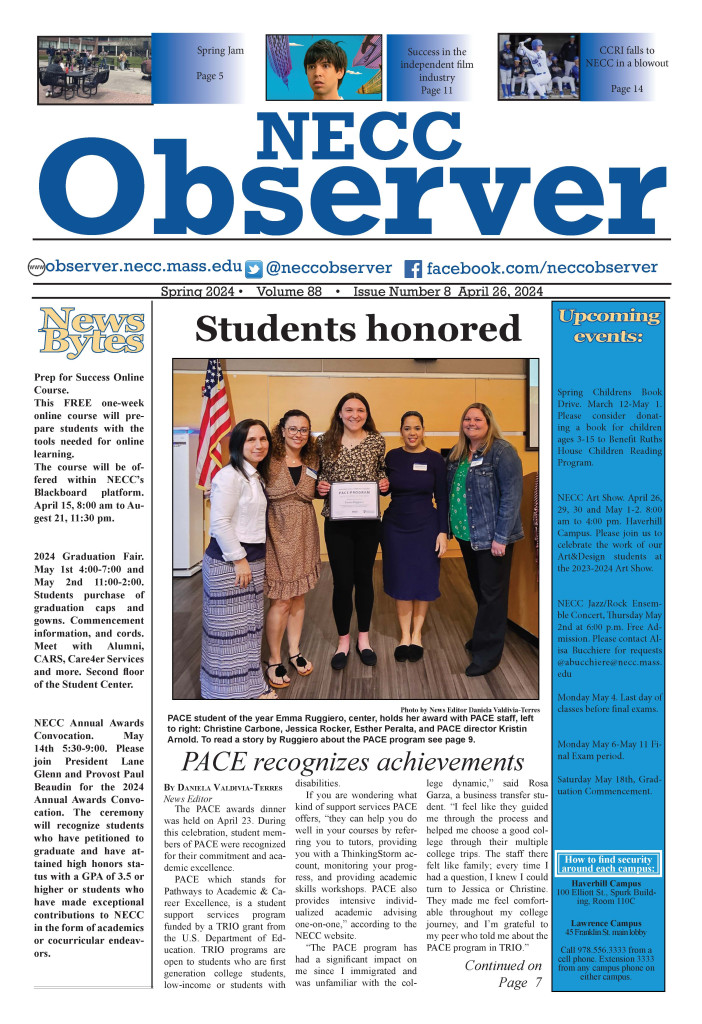Esraa Sadeek moved to the states from Alexandria, Egypt at the age of 3.
Sadeek is now 22, an alumna of NECC, a current Psychology and Victimology major at Endicott College and a single mother to her son Jaden, 3.
“I was raised in a strictly Islamic household,” she said. “I am very open about my faith and have no shame expressing that I am Muslim.”
Amidst the pride in her upbringing, Sadeek does not deny facing adversity.
“The last few months people have displayed more hate and anger towards me when they find out I am Muslim,” said Sadeek, referring to her interactions after the attacks carried out by ISIS, or ISIL. Sadeek went on to say, “ISIS is not Muslim.”
Sadeek said that the garb she wears on normal days garners a different reaction than her attire for special occasions.
“I wear a hijab on Islamic holidays and people absolutely treat me differently,” she said.
She said it is her belief that society has been conditioned to have a strong disliking towards those of the Islamic faith. She added that the belief that women in hijabs are inherently oppressed could not be farther from the truth.
“It is appalling how much some extra fabric on your head can change people’s views on you,” she said.
Meredith Gunning, a philosophy professor at NECC, has been teaching a world religions course since 2005. She said she first became aware of widespread Islamophobia in the wake of the 9/11 terrorist attacks, and offered education as an antidote to ignorance of other faiths.
“I do think it’s really important to study other religions. We live in a globalized world, we also live in a diverse culture in the U.S.,” said Gunning.
With regards to terrorist organizations that use the banner of their faith to justify brutal violence, Gunning said that this is not an indication of the entire religion’s beliefs and that anyone can “cherry pick” from any religion or sacred text to do heinous things.
“I prefer to call them Daesh, because ISIL gives them too much credibility,” said Gunning. “There’s direct things in the Quran that could be used to counter terrorists who kill, supposedly, in the name of Islam.”
Gunning would also like to clarify that — like fellow Abrahamic religions Christianity and Judaism — Islam may have started in the Middle East, but is, in fact, a worldwide religion and the fastest growing religion in the world.
“There will be more people belonging to Islam than Christians in under a decade,” said Gunning.
After 19 years in America, Sadeek still faces problems as an immigrant. “I struggle to provide my son and I with many things,” said Sadeek. “I work my butt off as a full time student and employee … to give him the best life possible.”
With a stable home, a full-time job and the commitment of going to college, one might get the idea that Sadeek feels secure. Unfortunately, the mounting tension against Muslim practitioners — quite visible in the media lately — has left her with a sense of unease.
“I fear that my son and I will pushed out of this country that we call home because of the bias and stigmatization the Islamic (community) is going through,” she said.
As for the Syrian refugees, she said America should allow them in. “Provide the refugees with a means to succeed such as English lessons, resources to receive enough food and temporary housing for a month, until they can get a job on their own,” said Sadeek. “That does not mean to give them free housing, 5 years of food stamps, a business and the world on a silver platter.” She understands that there is a level of struggle to overcome as an immigrant, because she saw her family go through it.
Gunning said that certain politicians’ “grandstanding” against the Islamic faith has not helped matters; for example, Donald Trump and Ted Cruz’s calls for a complete halt to Muslim immigrants, legal or otherwise, only helps to perpetuate irrational fear.
Gunning said, “Part of Islamophobia is claiming that those who are Muslim plan on taking over the whole world and forcing people to convert to Islam.” Americans using another’s religion against them as grounds for a ban, are falling victim to the effects of Islamophobia, and forgetting about our constitutionally-granted right to freedom of religion, said Gunning.
Ray Florent, a third-year Elementary Education major, has witnessed Islamophobia in class with Gunning. During Gunning’s world religions class. Florent recalls a particular student’s malice towards Muslims.
“She would say things like, ‘All Muslims are terrorists’ and ‘They all hate Americans,’” said Florent. One student, a Muslim whose identity was not provided for his safety, was so upset by this woman’s remarks that he left and never returned.
“I have friends who are Muslim,” said Florent. “No one deserves that kind of treatment.”
As for Sadeek, she is raising her son as a Muslim and has no plans of backing down to the criticism, still keeping her hopes up for the future.
“Everyone deserves to go to bed at night with the peace of mind that the sun will rise and they will still be breathing,” she said.

